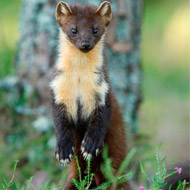
Births mark a significant moment in the mammal’s conservation
At least five pine marten kits have been born in Wales, marking a significant moment in the conservation of this native mammal.
Staff at the Vincent Wildlife Trust (VWT) say that at least three of the ten female pine martens that were introduced to Wales last year have given birth.
Delighted at the news, veterinary director Dr John Lewis from Wildlife Vets International, said: “Successful breeding is one of the major landmarks in any translocation, and to achieve this at such an early stage is a testament to the care taken by the VWT and all its partners in the Pine Marten Recovery Project.”
Natalie Buttress, CEO of the VWT added: “I am absolutely delighted. We have been waiting with bated breath for months to see if breeding would be successful.”
Pine martens carry the title of Britain’s second rarest carnivore after the wildcat, but in Wales they are on the verge of extinction.
In Autumn 2015, as part of the Pine Marten Recovery Project, twenty pine martens were relocated from a relatively strong population in Scotland to an area of woodland in Wales.
Since their release, staff and local volunteers have been tracking their movements daily. When they noticed a change in the behaviour of some of the females, it was sign that a birth might be imminent.
A further 20 pine martens are set to be relocated from Scotland in the Autumn, which should result in a self-sustaining population. Environmentalists hope that, over time, the animals will spread to other forests in Wales and across the border into England.
Image (C) James Moore



 The Veterinary Medicines Directorate (VMD) is inviting applications from veterinary students to attend a one-week extramural studies (EMS) placement in July 2026.
The Veterinary Medicines Directorate (VMD) is inviting applications from veterinary students to attend a one-week extramural studies (EMS) placement in July 2026.